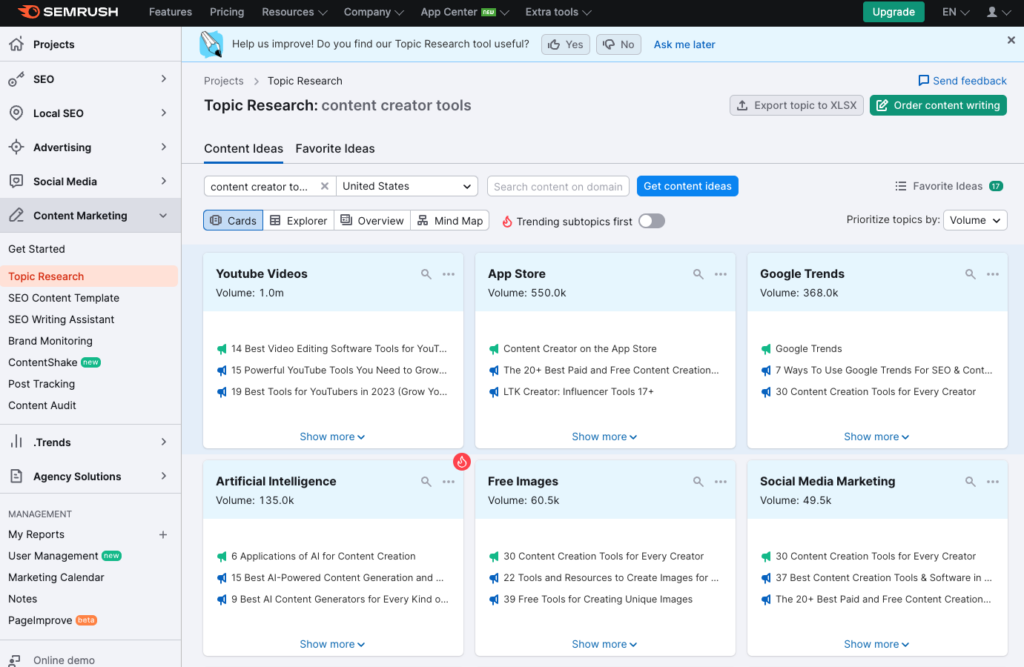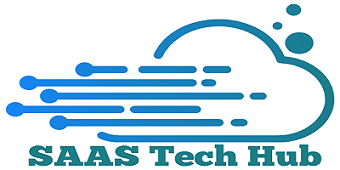Content creation is essential for researchers today. It involves crafting documents, presentations, and more.
Researchers often face tight schedules and need efficient tools. Choosing the right content creation tools can boost productivity and improve the quality of work. Whether you’re writing papers, creating visuals, or managing data, the right tools make a big difference.
This blog post will explore the best content creation tools for researchers. These tools help streamline tasks, improve collaboration, and ensure your research stands out. Stay tuned to discover which tools can enhance your research journey and make your work easier and more effective.
Introduction To Content Creation Tools
Content creation tools have become essential for researchers today. These tools help in organizing and presenting data effectively. They save time and improve the quality of research outputs.
Importance For Researchers
Researchers deal with vast amounts of data. They need tools to manage and interpret this data efficiently. Content creation tools offer features like data visualization, document formatting, and collaborative editing. These features make the research process smoother and more productive. Tools help in creating presentations, reports, and articles with ease.
Good content creation tools can simplify complex data. They make it easier to share findings with a broader audience. Researchers can focus more on their core work. They spend less time on formatting and editing.
Evolution In 2025
By 2025, content creation tools will have evolved significantly. AI will play a major role in automating many tasks. Tools will become more intuitive and user-friendly. They will offer advanced features like real-time collaboration and instant feedback.
Researchers will benefit from improved data analysis capabilities. Tools will offer better integration with other research platforms. Enhanced security features will protect sensitive data. The future of content creation tools looks promising for researchers.

Credit: empireflippers.com
Writing And Editing Tools
Researchers need effective writing and editing tools to produce clear and accurate content. Good tools help in drafting, revising, and polishing research papers. Here are some of the best writing and editing tools for researchers.
Top Writing Platforms
Choosing a good writing platform is essential. Here are some top choices:
- Scrivener: It helps organize long documents and manage notes.
- Microsoft Word: A classic tool for writing and formatting documents.
- Google Docs: Great for collaboration and easy sharing.
- Overleaf: Ideal for researchers using LaTeX for document preparation.
Best Editing Software
Editing software ensures clarity and correctness. Check out these top tools:
- Grammarly: Corrects grammar, spelling, and style issues.
- Hemingway Editor: Improves readability and highlights complex sentences.
- ProWritingAid: Offers detailed reports on various writing aspects.
- Ginger Software: Provides grammar checks and translation features.
| Tool | Key Feature |
|---|---|
| Scrivener | Organizes long documents |
| Microsoft Word | Classic writing and formatting |
| Google Docs | Collaboration and sharing |
| Overleaf | LaTeX document preparation |
| Grammarly | Grammar, spelling, and style |
| Hemingway Editor | Readability improvement |
| ProWritingAid | Detailed writing reports |
| Ginger Software | Grammar checks and translation |
Data Analysis And Visualization
Data analysis and visualization are vital for researchers. These tools help in understanding complex data. Researchers can draw meaningful insights. They present data in a visually appealing manner. This section highlights the best tools for these tasks.
Leading Analysis Tools
Several tools stand out for data analysis. R is a popular choice. It offers a wide range of statistical techniques. Researchers can use it for data manipulation and storage. Python is another favorite. Its libraries like pandas and NumPy are powerful. They make data analysis easier. SPSS is also widely used. It is user-friendly and offers a range of statistical tests. Researchers appreciate its ease of use.
Popular Visualization Software
Visualization software transforms data into visual formats. Tableau is a top choice. It allows users to create interactive dashboards. These dashboards are easy to share. Microsoft Power BI is another excellent tool. It integrates well with other Microsoft products. Users can create detailed reports and visualizations. ggplot2 in R is also popular. It helps in creating complex visualizations with simple code. Matplotlib in Python is versatile. Researchers use it to make a variety of plots. It is highly customizable.

Credit: www.youtube.com
Reference Management
Managing references can be a daunting task for researchers. It involves keeping track of numerous sources, organizing them, and citing them correctly. Effective reference management tools simplify this process. They help researchers save time and ensure accuracy. These tools are essential for writing high-quality research papers and articles.
Top Reference Managers
Several reference managers stand out for their features and ease of use. Zotero is a popular choice. It is free and open-source. Zotero helps in collecting, organizing, and citing research sources. Mendeley is another excellent option. It combines reference management with collaboration tools. Researchers can share documents and annotations with peers. EndNote is known for its robust features. It offers extensive citation styles and integration with databases. Each of these tools has unique strengths. Selecting the right one depends on your specific needs.
Integrating With Writing Tools
Seamless integration with writing tools is crucial for reference managers. Zotero integrates well with Word and Google Docs. This allows for easy citation while writing. Mendeley also offers plugins for Word. It supports LaTeX for those in scientific fields. EndNote provides similar integrations. It works with Word and other writing software. These integrations streamline the writing process. They ensure that references are correctly formatted and up-to-date.
Collaboration Platforms
Collaboration platforms are essential tools for researchers. They allow teams to work together efficiently, regardless of location. These platforms enable real-time communication, document sharing, and project management. This helps researchers stay organized and focused on their work.
Best Collaborative Tools
Several tools stand out for research collaboration. Google Docs is popular due to its ease of use. It allows multiple users to edit documents simultaneously. Slack is another great choice. It offers instant messaging and integrates with other tools. Trello provides visual project management. It helps track tasks and deadlines.
Features For Researchers
Collaboration tools offer features that benefit researchers. Real-time editing is crucial. It helps teams work on documents together without delays. Version control is also important. It tracks changes and allows users to revert to previous versions. Secure file sharing ensures data is protected.
Integration with other research tools is another key feature. This includes reference managers and data analysis software. Communication features like video calls and messaging help teams stay connected. Lastly, mobile access ensures researchers can work from anywhere.
Presentation And Design Tools
Researchers often need to present their findings in a clear and engaging way. Presentation and design tools help make data more understandable and visually appealing. Here, we explore the best options available.
Top Presentation Software
Creating a compelling presentation is crucial for researchers. Below are some of the top presentation software tools:
- Microsoft PowerPoint: Widely used, easy to navigate, and offers various templates.
- Google Slides: Cloud-based, allows collaboration, and integrates with Google Drive.
- Prezi: Dynamic presentations with zooming effects to keep the audience engaged.
- Keynote: Apple’s presentation tool, known for its sleek design and smooth transitions.
Best Design Platforms
Good design enhances the readability and impact of research presentations. Here are the best design platforms:
- Canva: User-friendly, offers a vast library of templates and design elements.
- Adobe Spark: Ideal for creating graphics, web pages, and video stories.
- Piktochart: Excellent for creating infographics and visual reports.
- Visme: Versatile tool for presentations, infographics, and other visual content.
These tools provide researchers with the resources they need to present their data effectively. They offer a variety of features to enhance both the visual and functional aspects of research presentations.
Multimedia Content Creation
Multimedia content creation is essential for researchers. It helps them present their work in engaging ways. Whether it’s a video, an audio recording, or a graphic, multimedia can make research more accessible and interesting. In this section, we will explore some of the best tools for creating multimedia content.
Video Creation Tools
Creating videos can greatly enhance your research presentation. Videos can explain complex ideas in simple ways. Here are some popular tools:
- Camtasia: Ideal for screen recording and video editing.
- Adobe Premiere Pro: Professional-grade editing software with powerful features.
- iMovie: Perfect for Mac users, easy to use and intuitive.
- Filmora: User-friendly with many built-in effects and transitions.
Audio Recording Software
Audio recordings can add another dimension to your research. They are useful for interviews, podcasts, and presentations. Here are some top audio recording tools:
- Audacity: Free, open-source, and versatile for recording and editing audio.
- GarageBand: Available on Mac, great for creating music and podcasts.
- Adobe Audition: Professional tool for high-quality audio production.
- Reaper: Affordable and rich in features for recording and editing.

Credit: blog.aweber.com
Future Trends In Content Creation
Content creation is evolving rapidly. Researchers need to stay updated with the latest tools and technologies. Future trends are shaping how content is created, shared, and consumed. Two key trends are AI and Machine Learning, and Virtual Reality Applications. Let’s dive into these exciting areas.
Ai And Machine Learning
Artificial Intelligence (AI) and Machine Learning (ML) are transforming content creation. These technologies help researchers generate high-quality content faster and with greater accuracy. AI can analyze vast amounts of data, identify patterns, and provide insights.
Key Benefits of AI and ML in Content Creation:
- Automated content generation
- Enhanced data analysis
- Improved accuracy and relevance
AI tools like natural language processing (NLP) can create text that reads naturally. ML algorithms can predict trends and suggest topics. These technologies save researchers time and effort.
Virtual Reality Applications
Virtual Reality (VR) is another trend in content creation. VR allows researchers to create immersive experiences. This technology is useful for visualizing complex data and conducting virtual experiments.
- Virtual laboratories
- 3D data visualization
- Interactive simulations
VR tools make it easier to understand and present data. They engage the audience and make the content more interactive. Researchers can use VR to create compelling and informative content.
Staying updated with these trends is essential. They offer new ways to create, share, and consume content. Embrace these technologies to enhance your research and make your work stand out.
Frequently Asked Questions
What Are The Best Content Creation Tools For Researchers?
There are many great content creation tools for researchers. Some top choices include Mendeley, Zotero, and EndNote. These tools help with reference management, organization, and collaboration.
How Can Mendeley Help Researchers?
Mendeley helps researchers by organizing their references, enabling collaboration, and offering a platform for discovering research papers. It’s user-friendly and integrates well with other tools.
Why Is Zotero Popular Among Researchers?
Zotero is popular because it is free, open-source, and versatile. It supports various citation styles and integrates with word processors.
What Features Does Endnote Offer Researchers?
EndNote offers powerful reference management, collaboration tools, and a wide range of citation styles. It also integrates with many databases and word processors.
Conclusion
Choosing the right content creation tools can enhance your research work. These tools save time and improve quality. They help you organize and present your findings better. Experiment with different tools to find the best fit for your needs. Stay updated with new tools to keep your research efficient.
Happy researching!

